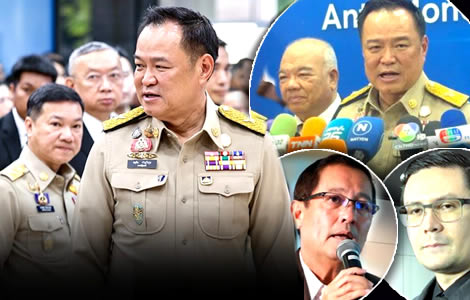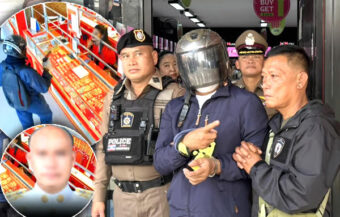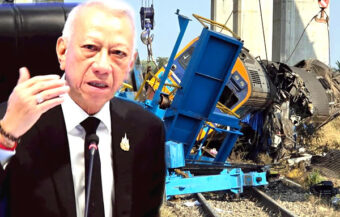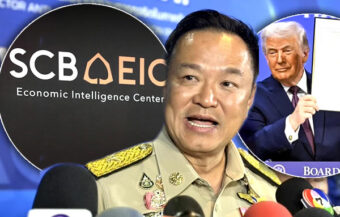Under pressure and facing a political firestorm, PM Anutin orders a full-scale crackdown on ‘Scambodia’ dirty money. He warns AMLO to act fast or risk crippling global sanctions as billions in scam cash flood Thailand, threatening the nation’s stability.
A determined Prime Minister Anutin Charnvirakul on Monday vowed to throw open the purse strings and fully arm the Anti-Money Laundering Office (AMLO) in a coordinated offensive to drive out the influx of ‘black’ capital threatening to poison Thailand’s economy and society. In a blunt warning to AMLO’s senior leadership, he stressed that the government must act decisively against the surge of scam-linked funds entering the country or risk a direct assault on Thailand’s integrity and economic stability. He cautioned that a loss of confidence among international partners could leave the nation facing adverse consequences, including possible financial sanctions.

Prime Minister Anutin Charnvirakul paid an urgent visit to the Anti-Money Laundering Office on Monday morning. His arrival came without ceremony, yet the message was unmistakable. Thailand is facing a profound threat from foreign scam syndicates, and the clock is ticking. Because of mounting cross-border criminal activity, the government is under intense pressure at home and abroad. In addition, the scandal around Cambodian scam-centre funds parked in Thailand has erupted into a national political firestorm.
As a result, the issue now stands at the centre of political debate. Many analysts believe it may determine next year’s General Election. Meanwhile, public frustration continues to grow as thousands of victims lose savings every week to sophisticated scam networks. Bank accounts are drained. Families are ruined. Social trust is shaken.
PM warns hesitation on scam funds risks crippling sanctions and global backlash for Thailand
During his visit, Prime Minister Anutin did not soften his tone. He warned AMLO leaders that decisive action is no longer optional. Instead, it is essential for protecting national stability, credibility, and economic security.
He stressed that authorities risk being overwhelmed by transnational cybercrime if they hesitate. Furthermore, he cautioned that the government could be viewed as complicit if it fails to respond quickly and effectively.
The Prime Minister also raised the possibility of foreign sanctions. He said such consequences would be devastating for Thailand’s economy, financial markets and international credibility. In addition, sanctions would undermine investor confidence and tourism, both pillars of the Thai economy. His warning reflected fears that Thailand could be labelled a permissive hub for grey money and digital fraud if action lags.
After the briefing, the Prime Minister told reporters that operations against scam networks, especially those operating from Cambodia, are accelerating. He vowed to intensify crackdowns and pledged continuous support for AMLO. Moreover, he said the government will work to cut off financial pipelines used by criminals to move enormous sums across Thai banks and digital platforms.
However, while the government attempts to seize the initiative, political tensions are intensifying. The People’s Party has seized upon the scam-fund controversy and is aggressively targeting the government.
Opposition raises the heat as People’s Party seizes scam fund scandal to attack government ministers
Rangsiman Rome MP, the outspoken chairman of the Committee on National Security, has demanded testimony from key ministers. The People’s Party firebrand wants Deputy Prime Minister Thamanat Prompow and the Minister of Education Narumon Pinyosinwat to appear before his committee. Yet both have notably refused.
Additionally, former Deputy Finance Minister Woraphak Thanyawong resigned under pressure the week before last. He denied wrongdoing, insisted on his innocence, and criticised political opponents for “false accusations.” His exit, however, has only fuelled speculation. It has also highlighted the seriousness of the scandal and its reach into senior government levels.
At the same time, the grave nature of this political battle is only now being seen. On November 3, Captain Anudit Nakornthap of the Kla Dharma Party accused Rangsiman Rome of spreading false information.
He said claims linking Deputy Prime Minister Thammanat Prompao to international grey-capital networks were fabricated. According to Captain Anudit, Mr. Rangsiman distorted facts for political gain. He argued that allegations were unsupported and presented solely to create public prejudice.
Government allies rebut allegations as opposition accused of harming innocents in grey capital controversy
He also highlighted the case of “Ben Smith,” or Benjamin Mauerberger, a South African financier who was dragged into the controversy. According to Captain Anudit, Mr. Smith has no connection to grey-capital networks.
However, a different individual, American fraudster Lawrence E. Feldman, had used the alias “Benjamin Berger” to deceive more than 300 victims. He added that AMLO had recently confirmed that no investigations or arrest warrants exist for Ben Smith. The second biggest government party accused the People’s Party MP of recklessness and harming innocent people’s reputations.
Furthermore, Captain Anudit explained that Thammanat and Education Minister Narumon Pinyosinwat missed the parliamentary hearing because they believed the forum was “politically weaponised.” He insisted that both cabinet ministers stand ready to cooperate with formal investigative procedures. He challenged opposition MPs to submit evidence to law-enforcement agencies if they possess facts, rather than campaign through media soundbites.
Despite the acrimony, the Kla Dharma Party also issued strong policy proposals. They demand a unified crackdown against scam networks. They urged the use of AI, big-data systems, specialised financial intelligence units, and joint regional task forces.
They call for zero tolerance regardless of an offender’s political influence or wealth. Finally, they warn that weaponising accusations linked to the issue threatens justice and destabilises democracy.
AMLO reports billions seized and mule accounts frozen as government orders rapid cybercrime crackdown
Meanwhile, the Prime Minister issued explicit instructions to AMLO. He demanded aggressive action and warned that foreign regulators are monitoring Thailand’s response. Because digital scammers use Thai accounts as financial transit points, the country risks reputational harm. He said AMLO must act with speed and precision.
Officials briefed him on progress. Over the past year, AMLO seized ฿29 billion in criminal assets. They pursued 160 cases and froze more than 800,000 mule accounts used by online scam rings. However, over ฿3 billion remains frozen in these accounts and must be returned to victims.
Furthermore, four key Thai agencies are preparing an MOU. The agreement will join AMLO, the Ministry of Interior, the Royal Thai Police and the DSI in a coordinated war against money-laundering and cybercrime.
The Prime Minister said he could not reveal details because operations must remain confidential. He also highlighted that cybercrime is now a national-security priority requiring full government backing.
PM highlights urgency and backs AI surveillance to outpace cybercriminals and protect the nation
During his remarks, Prime Minister Anutin emphasised urgency. He reminded the public that Thailand has already seized billions linked to online scam networks. Yet, he warned that many criminal operations are hidden and require intelligence-driven investigations. Because premature disclosure risks tipping off criminals, many enforcement efforts remain confidential. Nevertheless, he insisted that progress is real and ongoing.
Critically, he stressed the need to stay ahead of criminal technology. Cybercrime groups operate sophisticated laundering pipelines across Southeast Asia, often moving funds through crypto channels, digital wallets, fake-identity accounts, and cross-platform transfer systems.
Therefore, the Prime Minister endorsed investment in artificial-intelligence surveillance tools and rapid-analysis capabilities. He promised to support AMLO’s funding requests if central funds are needed.
In addition, he warned that failure to act could cause long-term damage. International banks and regulators may impose restrictions. Foreign partners may downgrade cooperation. Cross-border investigations may slow. And Thailand’s image may suffer severe harm. The consequences would stretch from the banking system to ordinary citizens who rely on stable financial markets.
Thailand faces high stakes as government trust, economic stability and global standing hang in balance
The Prime Minister also acknowledged regional concerns. He said leaders at the ASEAN Summit and APEC meetings raised questions about financial crime networks in Southeast Asia. They expect Thailand to demonstrate leadership and containment. As a result, he is directing agencies to intensify action and accelerate intelligence sharing.
There is also a domestic urgency that goes beyond politics. Thousands of ordinary Thais fall victim to scams every month. Elderly citizens lose pensions.
Young workers lose wages. Entire families face ruin. Scam call centres, fake investment schemes, cryptocurrency fraud rings, and online romance scams are rampant. Meanwhile, mule-account brokers recruit students and low-income workers to sell bank access.
Consequently, the pressure on Thai authorities is immense. The public demands results, transparency, and rapid relief. Investors demand stability. International allies demand accountability. And opposition parties demand answers.
Yet, the battle will not be easy. Scam syndicates employ advanced encryption, offshore hosting, and laundering routes through multiple Asian nations. They operate armed compounds, exploit migrant workers, and partner with corrupt actors across borders. Some syndicates even operate under the protection of power networks in neighbouring states. Thus, cracking down requires not only domestic resolve but regional diplomacy and intelligence sharing.
Government confidence meets rising scepticism as critics warn masterminds avoid justice and reforms lag
Still, the government insists it is prepared. It claims progress. It points to seizures, arrests, and international cooperation. The Prime Minister says law enforcement agencies are aligning to crush illegal networks.
However, scepticism remains. Critics argue that prosecutions often target low-level operatives, not masterminds. They say political power shields influential figures linked to illicit capital flows. In addition, they warn that slow reforms expose Thailand to reputational risks and economic pain. Therefore, they are now demanding visible results, not promises.
Former minister and party leader Sudarat warns of ฿20 billion plot by ‘Scambodia’ to take political power
Cambodian scam centre mess in Thailand threatens to topple interim government sooner rather than later
PM vows action on rising gold exports to Cambodia and the runaway Thai baht against the US dollar this year
Nevertheless, the stakes are enormous. Failure could push Thailand toward financial isolation, international scrutiny and domestic hardship. Success, however, could rebuild trust, protect citizens, and secure the nation’s digital and economic future.
For now, Thailand is at an inflection point. The government must prove that its institutions can defend citizens, protect the financial system, and shut down criminal gateways. Meanwhile, the months ahead will define political fortunes, test national resolve, and shape Thailand’s global standing. The battle has begun. And it certainly looks like there will be no turning back.
Join the Thai News forum, follow Thai Examiner on Facebook here
Receive all our stories as they come out on Telegram here
Follow Thai Examiner here
Further reading:
High powered, secretive meeting chaired by PM agrees robust action against Cambodian networks
Thailand and Cambodia face danger from ‘Dragon Head’ the Chinese mafia leader behind the scams
Cyber police and Money Laundering agency seek UK and US co-operation targeting Cambodian networks
United States, South Korea and United Kingdom act against Cambodian scam industry with Thai tie-ins
Ben Smith affair & allegations of links to Cambodian scam centres continues to rage in parliament
Defiant Rangsiman Rome warns he’s not just fighting a defamation case but for the future of Thailand
Ben Smith money fixer to the elite in Thailand lines up ฿100M defamation case against Rangsiman Rome


















